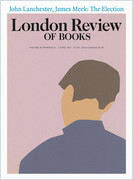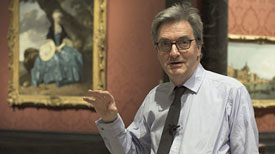The Election
One of the secret scandals of modern Britain has been the increase in the death rate. In England and Wales it went up by 5.4 per cent in 2015, an extra 27,000 deaths over the year before: too big a number to be a statistical glitch. The death rate fell from the mid-1970s until the arrival of the coalition, but has been going up since 2011. The fact that the death rate fell under successive Tory and Labour regimes and is only now rising suggests that there is something specific about recent policy which is making the death rate worse. The likeliest culprit is changes to social care, in particular care of the elderly. This is nothing like as big a scandal as it should be. Who should you vote for if you want this to change? More
Verhofstadt’s Vision
Like many participants in discussions about the future of the EU, Verhofstadt fails to make some basic distinctions between power, competences and sovereignty. The UK ceded many competences to Brussels, but it never gave up sovereignty; otherwise the Brexit referendum and the bitter outcome of leaving the club wouldn’t have been legally possible. Brexit will indeed return some legal competences to London, but it will mean less power for the UK in the world, as the clout of Theresa May’s ‘global Britain’ (an extreme example of fantasy politics) will be much less than what the UK in conjunction with 27 other countries could have achieved in trade, security and many other areas. More
Dacre’s Paper
The Daily Mail is like the drunken lout at a party who can’t get anyone to like him. Suddenly all the girls are sluts and all the men are poofs and he’s swinging at the chandelier before being huckled outside to vomit on the lawn. The Mail desecrates the holy places where it likes to stake its claim, and would be a laughable rag, really, were it not for our degraded political culture taking it seriously. Look at the paper itself and you see it is not the real voice of England, but a dark distortion of it, a post-truth version that shouts about decency but doesn’t exhibit any, that praises aspiration but only certain sorts. More
Panthers in Algiers
It was June. I remember it very clearly. I can see myself walking down a side street between the Casbah and the European sector of Algiers towards the Victoria, a small, third-rate hotel. I climbed four flights of stairs and knocked. The door opened and there was Eldridge Cleaver, and beyond him, flat out on the bed, his wife, Kathleen, eight months pregnant. The sense of awe I felt that day never left me. The shortcomings of the Black Panther Party are clear enough in retrospect, but they took the battle to the streets, demanded justice and were prepared to bear arms to protect their community. More
LATEST AUDIO AND VIDEO
AUDIO The Corbyn Project
Tom Crewe and Lorna Finlayson discuss Labour’s prospects. Listen »
VIDEO Impresario
Nicholas Penny looks at Kenneth Clark’s time at the National Gallery. Watch »






